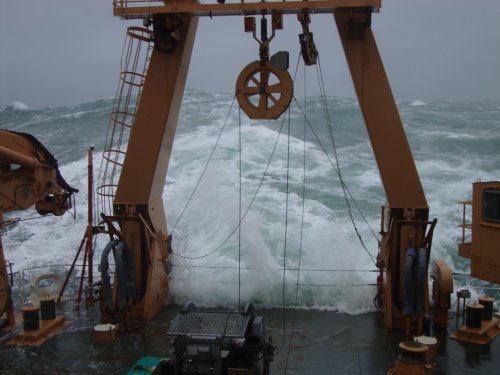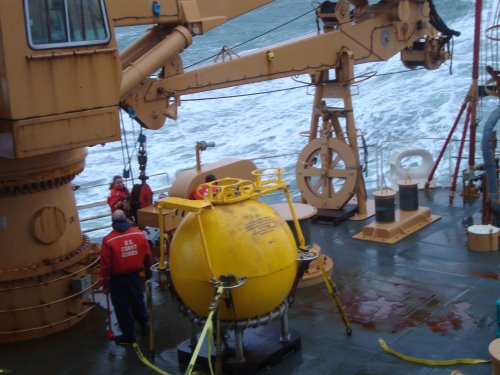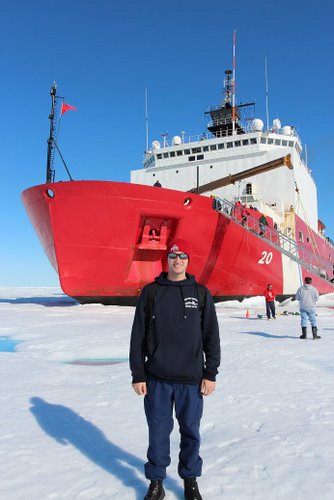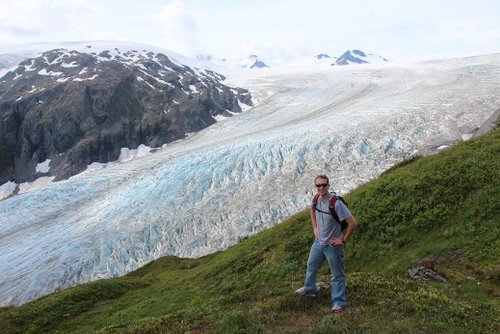The weather in the Bering Sea is continuing to make Science operations difficult. We are operating in the worst seas we have seen this voyage. Huge waves crashing over the fantail caused a few problems. The fantail and focsule areas of the ship were secured due to high seas.
 Large wave crashes over the fantail
Large wave crashes over the fantail
The MST's and MK2 Schumacher were called to the fantail to close vents. These vents were leaking seawater into the steering room every time a wave crashed over the fantail. They also fastened a few loose items down. The Science party gathered in the AftCon to watch the excitement. The Pipes warned us to expect “heavy rolls” as Healy came about in the Sea. We experienced a 9 degree roll and a 14 degree roll. That is enough to knock over chairs, slide computers and stuff off workbenches and open drawers in cabinets.
 MST's work to close vents to stop seawater from leaking into the steering room
MST's work to close vents to stop seawater from leaking into the steering room
Today, I would like to introduce you to a recent US Coast Guard Academy graduate, Ensign Eric Schwartz. ENS Schwartz graduated in May 2011, and reported to HEALY in June 2011. Counting Academy time, he's been in the Coast Guard for over 4.5 years, though the 4 years at the Academy do not count towards retirement.
 ENS Schwartz on Ice Liberty from the Healy
ENS Schwartz on Ice Liberty from the Healy
ENS Schwartz grew up in a small town in the hills of eastern Ohio called Barnesville, where he graduated high school in 2007. He had a month off before reporting to the US Coast Guard Academy in July 2007 for "Swab Summer," the Academy's 7-week indoctrination training period. After 4 challenging, but very rewarding, years at the Academy, he graduated as an O-1 (Ensign) with a degree in Operations Research (very similar to Industrial Engineering.) He received his top pick for his first assignment, a 2-year tour as a Student Engineer onboard USCGC HEALY. Student Engineering positions typically go to people who graduate with an engineering degree, but that is not always the case and is not a requirement. As a Student Engineer, he focuses mostly on learning about naval engineering (electrical and mechanical systems, making sure the ship runs), but also to learn as much as possible about shipboard life as a whole. So one of his requirements are also to learn about the operations side the ship, and he must spend some time on the Bridge to obtain a Deck Watch Officer qualification in addition to his engineering qualifications.
When I asked ENS Schwartz about his favorite Coast Guard memories he said that there are really too many to pick from. He's had so many great experiences in his time in the Coast Guard. He's traveled all over the United States and was even sent to Mexico to meet USCGC EAGLE. He's met numerous successful and important people, including high-ranking officials in the Coast Guard, DHS, and even shook hands with President Obama during his graduation. If he had to pick, his favorite memories would be from his senior year at the Academy, especially right towards the end around graduation. By that point he had become closer to many of my classmates than he ever imagined. They had been through a lot of hard times together and had persevered, creating a bond not found anywhere else. 4 years before, he had no clue who any of them were, and by the end he knew all 228 of them.
 ENS Schwartz at a glacier
ENS Schwartz at a glacier
When I asked what advice ENS Schwartz would give to students who may be interested in not only joining the Coast Guard, he was clearly biased. He explained that the Coast Guard is great because of its humanitarian nature and its small size. The size of the Coast Guard is comparable to the size of the Ne York Police Department. The other armed services make the Coast Guard look tiny, but at the same time the Coast Guard has more of a family atmosphere. You run into people you know in the Coast Guard everywhere. Being in the Coast Guard is not for everyone though. The military rewards hard workers and people who challenge themselves. If you want something, all you have to do is work for it and eventually you'll get there. In my opinion, keeping a positive attitude is one of the best things you can do not only in the military, but also in life. It can help you succeed in the civilian world too.
ENS Schwartz continued, “If you are interested in the officer career path, some advice would be for you to know the different ways you can get there, and what being an officer is all about. Being an officer can be very difficult, but is an experience like no other. You're put in charge of leading people not long after being commissioned, after 4 years hitting the books. At 21 or 22 years old, that can be quite a challenge. But it provides a great learning experience too. As a young officer you are expected to make mistakes, and knowing that, people help you out. Officers are expected to put in extra hours to get the job done. We get paid more, but it comes with more responsibility.”
The most common way to the officer corps in the Coast Guard is going through the Academy. The Academy is the Coast Guard's equivalent of Annapolis or West Point. It is a 4-year college in a military atmosphere. Every day is regimented and is reflective of what you would experience in the fleet after graduation. The Academy develops cadets to be commissioned officers in the Coast Guard as pilots, ship drivers, engineers, and responders to and preventers of maritime incidents, among others. You can also become an officer by going through Officer Candidate School (OCS), which is also run at the Academy, and is a 17-week program. One major requirement to go through OCS is that you already have a college degree. Finally, there is a Direct Commission program for people who transfer in from other services, or for people who have specific skills that the Coast Guard wishes to have in its work force. All paths require you to show some leadership potential to be accepted (community service, Eagle Scout, team captain, etc.)
New Vocabulary
Focsule - the most forward part of a ship
Question of the Day
The following graphs show Temperature and Salinity data for the Point Hope line. Analyze the relationship between depth and salinity and depth and temperature.
 Point Hope Graphs and Location
Point Hope Graphs and Location
Stay tuned as we continue our exciting voyage on the USCG Cutter Healy. Until then...
“Live as if you were to die tomorrow. Learn as if you were to live forever.” - Mohandas Gandhi

